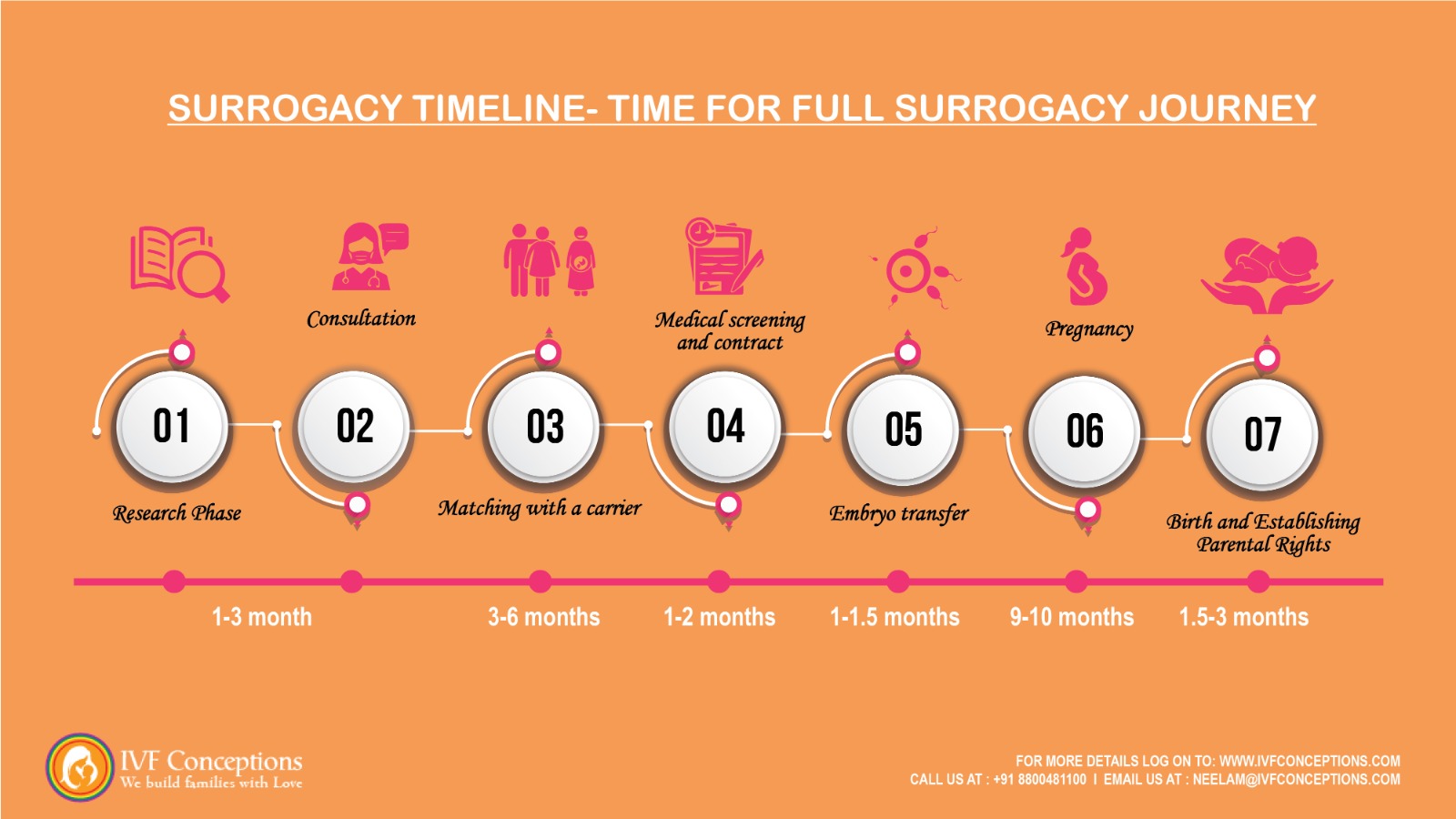How Long Does the Surrogacy Process Take?
Gestational surrogacy is undoubtedly a complex and time-consuming process, with variations depending on numerous factors. Some intended parents may complete the journey relatively quickly, while others might find it takes much longer. This comprehensive guide will explore the typical timeline of the surrogacy process, key factors that can affect the duration, and what intended parents need to know to navigate this path successfully.
- Book an online appointment: Get a free online consultation.
- Call\W:+91-8800481100 Email:neelam@ivfconceptions.com
How Long Does the Surrogacy Process Take?
The typical surrogacy process takes 18 months to 24 months depending upon the individual circumstances
Outlines the surrogacy process timeline for intended parents:
| Stage | Description of Stage | Duration |
| Research Phase | Explore family building options and decide on surrogacy. | Personal timeframe |
| Consultation and Application | Choose a surrogacy agency, sign agreement, and start embryo creation (if needed). | 1-3 Months |
| Matching | Agency finds and presents potential gestational carriers. Meet and decide on a match. | 3-6 Months |
| Medical Screening and Contracts | Carrier undergoes medical and psychological screening. Sign surrogacy contract. | 1-2 Months |
| Embryo Transfer | Prepare for embryo transfer. Success may take multiple attempts. | 1-1.5 Months |
| Pregnancy | Gestational carrier’s pregnancy, approximately 40 weeks. | 9-10 Months |
| Birth and Postpartum | Baby’s birth, establish parental rights, and postpartum period. | 1.5-3 Months |
Please keep in mind that the durations mentioned in the table are approximate and can vary depending on individual circumstances and other factors. Always consult with a reputable surrogacy agency or professional to get personalized guidance throughout the surrogacy journey.
More Resources to Read:
Top Countries for Surrogacy: A Comprehensive Guide for Intended Parents
Understanding Surrogacy Laws by State
Top Countries for Surrogacy: A Comprehensive Guide for Intended Parents
Average Cost of a Surrogate: What to Expect
Types of Surrogacy: An Overview
Understanding the different types of surrogacy is essential for intended parents as the process and timelines vary depending on the type chosen.
| Surrogacy Type | Description | Genetic Relationship |
| Gestational Surrogacy | The surrogate carries a baby conceived through IVF using the intended parents’ or donors’ sperm and egg. The surrogate has no genetic link to the child. | No genetic link to the surrogate |
| Traditional Surrogacy | The surrogate uses her egg, fertilized by sperm from the intended father or donor. The surrogate is both the carrier and the genetic mother. | Genetic link to the surrogate |
Types of Surrogacy Agreements
Surrogacy agreements can also significantly impact the timeline and legal requirements of the process.
| Agreement Type | Description | Countries Where Legal |
| Altruistic Surrogacy | No financial compensation is given to the surrogate, except for medical expenses. Often, the surrogate is a close friend or family member. | UK, Canada, Australia |
| Commercial Surrogacy | The surrogate is compensated for her time and effort in addition to medical expenses. This form is often preferred by those without close surrogates. | USA (some states), Georgia, Ukraine |
Timeline of the Surrogacy Process

The surrogacy process involves several critical stages, each with its own timeline. Below is a breakdown of the typical surrogacy timeline:
1. Deciding Whether Surrogacy Is Right for You (1-6 Months)
The first step in any surrogacy journey is deciding if this is the right path for you. This decision-making process can take anywhere from one to six months. Intended parents need to weigh the pros and cons, consider financial implications, and research surrogacy laws in various countries. Given the high costs of surrogacy in the USA, many intended parents look into cross-border surrogacy options in more affordable yet legal destinations.
2. Choosing a Surrogacy Agency (1 Week to 1 Month)
Selecting the right surrogacy agency is crucial. The agency will guide you through the entire process, from matching with a surrogate to legal and medical procedures. When choosing an agency, consider their track record, the number of successful cases, and the level of support they provide.
3. Medical and Psychological Screening (1-4 Weeks)
Before proceeding, both the surrogate and the intended parents undergo thorough medical and psychological screenings. This process ensures that all parties are physically and emotionally prepared for the surrogacy journey.
- Medical Screening: This involves tests like pap smears, blood tests, hysteroscopy, and other necessary exams. If using an egg donor, the intended mother may skip certain hormonal tests.
- Psychological Screening: A licensed counselor will assess the emotional readiness of the surrogate and her family, ensuring they are fully aware of the challenges and responsibilities involved.
| Screening Type | Typical Duration |
| Medical Screening | 1-4 weeks |
| Psychological Screening | 1-2 weeks |
4. Finding a Surrogate Match (2 Weeks to Several Months)
Finding a surrogate who aligns with your expectations and values is a critical part of the process. Some intended parents find a match quickly, while others may take months. The matching process involves reviewing profiles, interviews, and initial meetings to ensure compatibility.
5. Legal Contracts (2-6 Weeks)
Once a match is made, the next step is to establish legal contracts. Each party will have their own lawyer to ensure that their rights and interests are protected. This process usually takes two to six weeks, depending on the complexity of the agreement and the legal requirements of the jurisdiction.
6. Medication and Embryo Transfer Preparation (4 Weeks)
After legal agreements are signed, the medical preparations for embryo transfer begin. The surrogate will start taking medication to prepare her body for pregnancy, which typically takes around four weeks. During this time, regular medical appointments will monitor her response to the treatment.
7. Embryo Transfer and Pregnancy Confirmation (2-4 Weeks)
The embryo transfer is a critical step in the surrogacy process. If the transfer is successful, the surrogate will continue on medication for the first 10-12 weeks of pregnancy. If the first transfer is unsuccessful, a second transfer may be scheduled after a two-month break.
8. Pregnancy and Delivery (40 Weeks)
Once pregnancy is confirmed, the journey continues like any typical pregnancy, with regular check-ups and monitoring. Delivery usually occurs around 40 weeks from the start of the IVF cycle. After delivery, the surrogate and the new family part ways, with the surrogate often maintaining a relationship with the family.
Factors Influencing the Duration of the Surrogacy Process

Several factors can affect how long the surrogacy process takes, including:
- Availability of Surrogates: The number of surrogates an agency is currently working with can impact how quickly you find a match.
- Legal Requirements: The complexity of legal processes in your country or the surrogate’s country can add time to the process.
- Medical Factors: The number of IVF cycles required to achieve a successful pregnancy can vary.
- Cross-Border Surrogacy: In countries where surrogacy is well-regulated and established, the process may be faster due to streamlined legal and medical procedures.
More Resources to Read:
Conclusion: How Long Does Surrogacy Take?
In conclusion, the surrogacy process typically takes between one to two years from start to finish, but this can vary widely based on individual circumstances. Intended parents must be prepared for a journey that involves significant time, emotional investment, and financial commitment. However, for many, the end result—a healthy baby and a new family—makes the journey worthwhile.
If you’d like to learn more about IVF, Egg Donation, or surrogacy services globally, check out the rest of our website at Georgia Surrogacy Agency. We offer legally secure and affordable surrogacy consulting services for FREE.
Get in touch for FREE SURROGACY CONSULTING:
Mobile: +91-8800481100 ( WhatsApp, Line, Viber)
Email: neelam@ivfconceptions.com

FAQs: Understanding the Surrogacy Process
1. How long does the entire surrogacy process typically take?
The surrogacy process usually takes between one to two years from start to finish. This includes everything from deciding to pursue surrogacy, finding a surrogate, legal and medical procedures, to the pregnancy and delivery of the baby.
2. What factors can influence the length of the surrogacy process?
Several factors can affect the duration of the surrogacy process, including the availability of surrogates, the complexity of legal requirements in your country or the surrogate’s country, and the number of IVF cycles required to achieve a successful pregnancy.
3. What is the difference between gestational and traditional surrogacy?
In gestational surrogacy, the surrogate carries a baby conceived through IVF using the intended parents’ or donors’ sperm and egg, with no genetic link to the child. In traditional surrogacy, the surrogate uses her own egg, making her both the carrier and the genetic mother of the child.
4. Is surrogacy legal everywhere?
Surrogacy laws vary by country and even by state. Some countries only allow altruistic surrogacy (where the surrogate is not compensated beyond medical expenses), while others permit commercial surrogacy. It’s important to research the laws in your jurisdiction before starting the process.
5. How do intended parents find a surrogate?
Intended parents typically find a surrogate through a surrogacy agency. The agency will match them with a surrogate based on compatibility and shared goals. This process can take anywhere from a few weeks to several months.
6. What are the costs associated with surrogacy?
Surrogacy can be expensive, especially in countries like the USA where commercial surrogacy is legal. Costs can include medical expenses, legal fees, surrogate compensation (if applicable), and agency fees. Cross-border surrogacy may offer more affordable options, but it also comes with additional legal and logistical considerations.
7. What happens if the first embryo transfer is unsuccessful?
If the first embryo transfer is unsuccessful, the surrogate may need to undergo a second transfer after a break of about two months. The process will continue until a successful pregnancy is achieved, within the limits agreed upon in the legal contract.
8. Can the surrogate change her mind and keep the baby?
In gestational surrogacy, legal contracts are in place to protect the rights of the intended parents. Once the baby is born, the surrogate has no legal rights to the child. However, the specifics can vary depending on the laws of the country or state where the surrogacy takes place.
9. Is psychological support provided during the surrogacy process?
Yes, both the surrogate and intended parents typically undergo psychological screening before beginning the process. Ongoing psychological support may also be available throughout the surrogacy journey to help all parties navigate the emotional aspects of the process.
10. What happens after the baby is born?
After the baby is born, the surrogate and the new family will usually go their separate ways, though many surrogates and families choose to maintain a relationship. The intended parents will take full custody of the baby, and any necessary legal procedures to finalize parenthood (such as adoption or legal recognition) will be completed.

Highly esteemed, authoritative, and trusted professional with a 14-year of experience in international surrogacy. Advocate for Secure, Legal, and Affordable International Surrogacy.
Neelam Chhagani, MA (Counselling Psychology) and Holistic Infertility and Third-Party Reproduction Consultant.
Member of European Fertility Society, Best Surrogacy Blogger of 2020, with 300 dedicated blogs, and top contributor on Quora for Surrogacy.


Add Your Comment